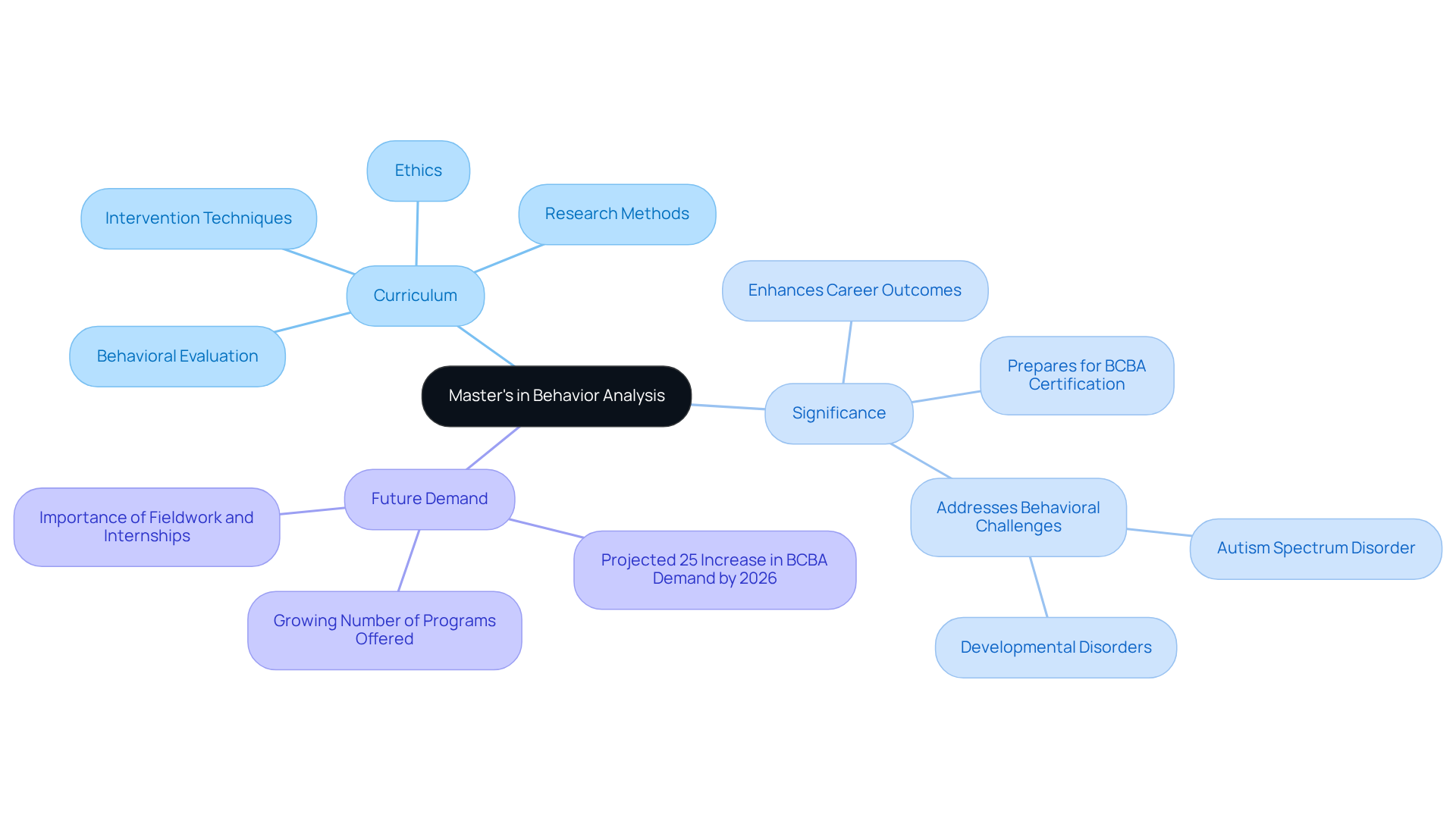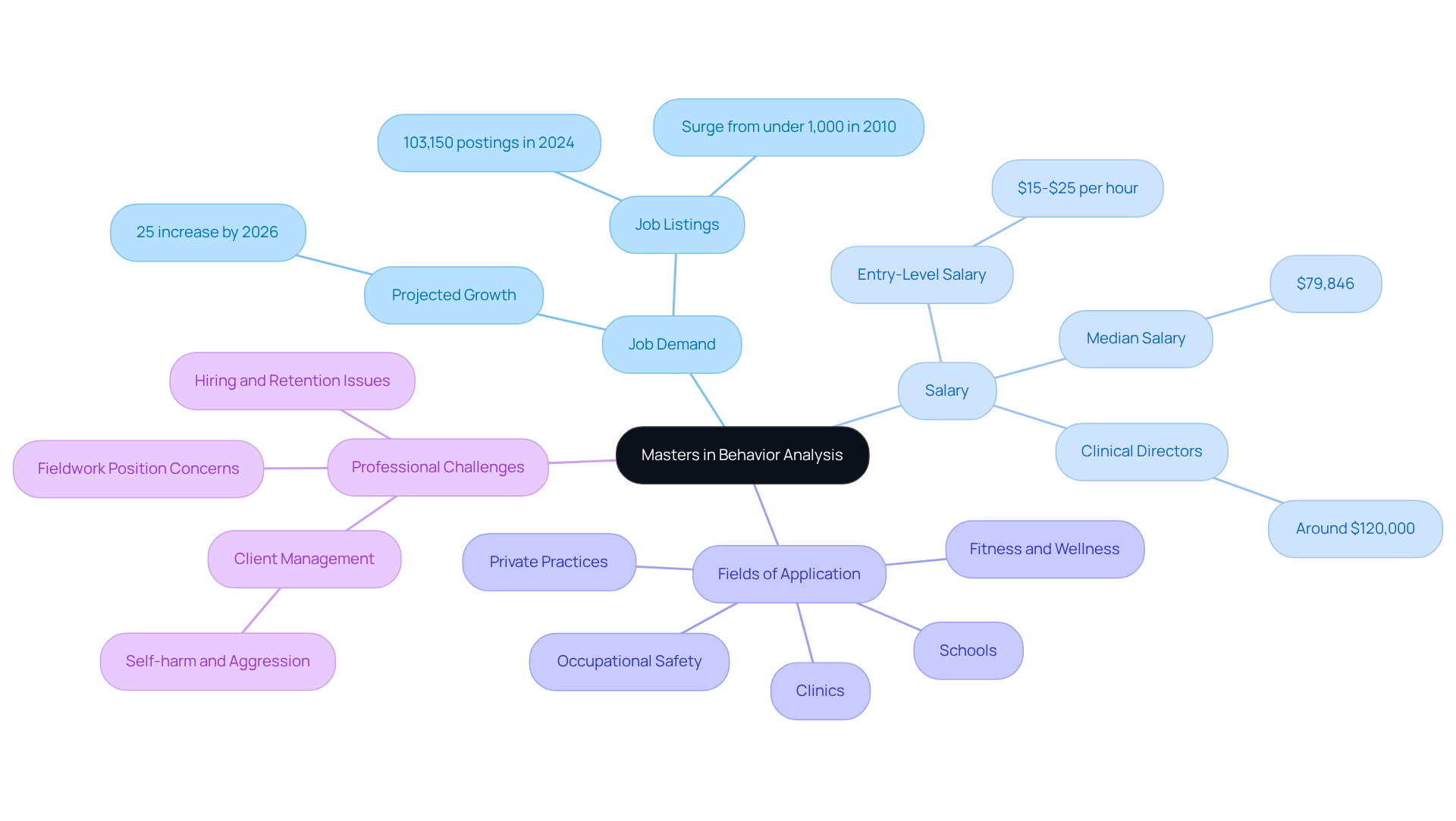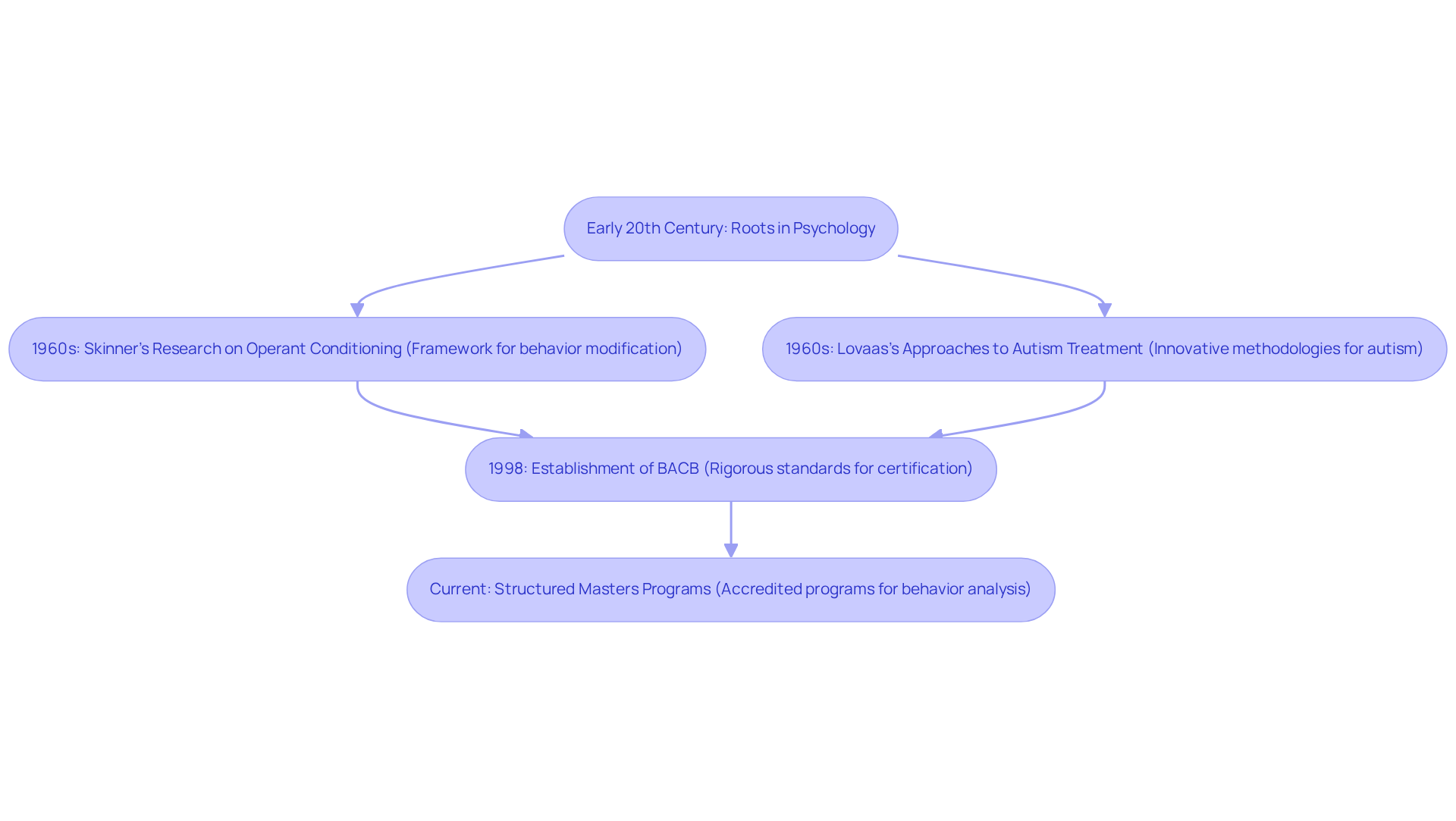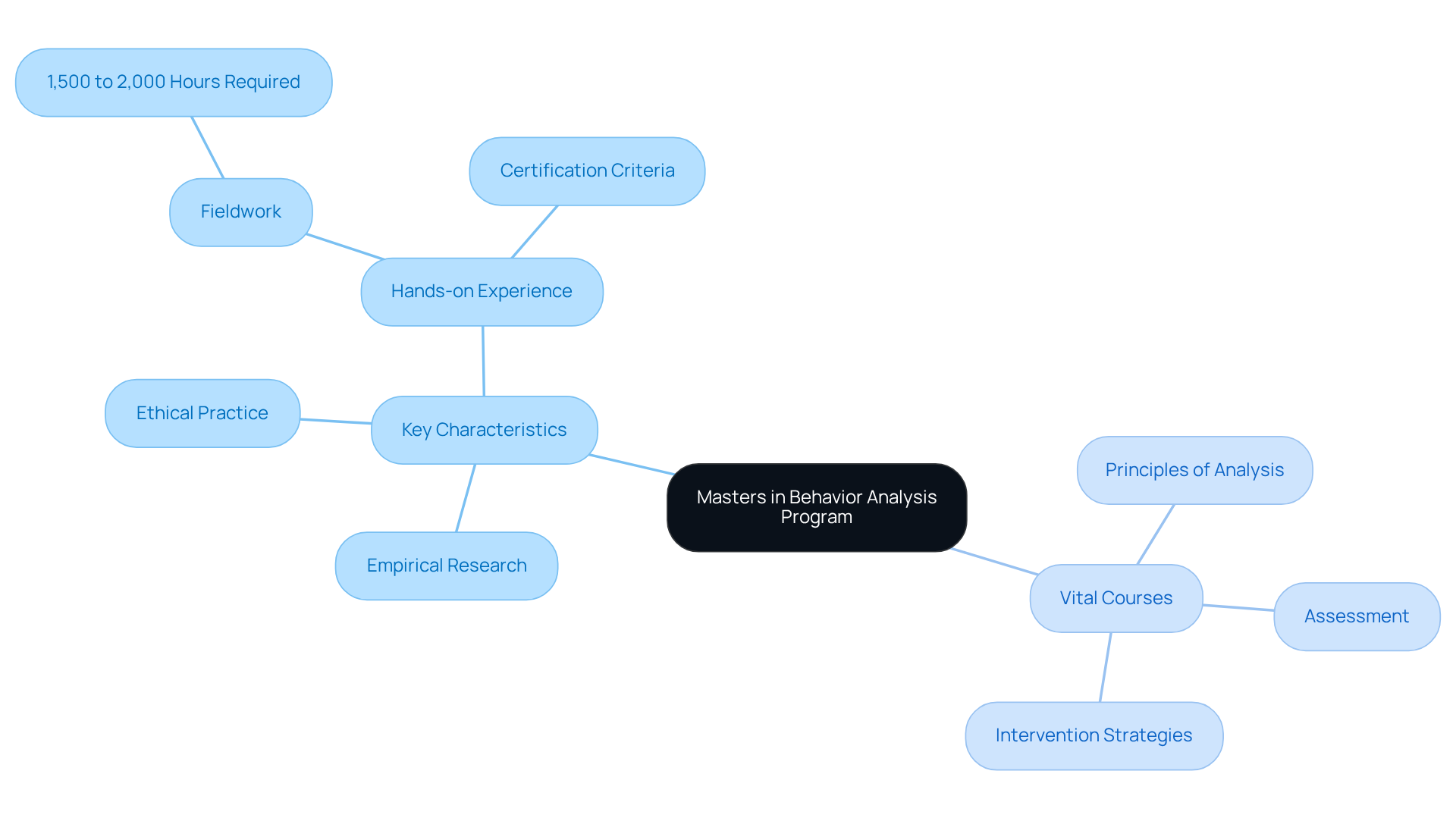June 26, 2025

The article highlights the critical importance of obtaining a Master's in Behavior Analysis, particularly in light of the surging demand for Board Certified Behavior Analysts (BCBAs). With a staggering increase in job opportunities, this advanced degree not only reflects a historical evolution in the field but also equips students with essential skills and knowledge to tackle behavioral challenges effectively.
As the curriculum evolves, it prepares graduates for impactful roles in various settings, including education and healthcare. This growing need for qualified professionals underscores the value of the degree, making it a pivotal investment for those seeking to make a difference in the lives of individuals facing behavioral issues.
Are you currently facing challenges in hiring qualified behavior analysts? Consider how Hire ABA can streamline your recruitment process, connecting you with top talent in the field. By leveraging this platform, you can ensure that your organization is equipped with the expertise necessary to address these pressing needs.
In conclusion, the Master's in Behavior Analysis stands as a beacon of opportunity, reflecting the increasing job market demand for BCBAs. Embrace this chance to enhance your team's capabilities and drive positive change in your organization.
The field of behavior analysis is undergoing a significant transformation, propelled by a surging demand for skilled professionals who can tackle complex behavioral challenges.
With projections indicating a remarkable 25% increase in demand for Board Certified Behavior Analysts (BCBAs) by 2026, the urgency for qualified experts has never been more pronounced.
A master's in behavior analysis not only lays a solid foundation in applied behavioral analysis principles but also equips graduates with essential tools to make a substantial impact across diverse sectors, including education and healthcare.
As aspiring professionals consider their paths, the pressing question arises: how can they effectively navigate the evolving landscape of this crucial degree to maximize their career potential and address the urgent needs of the communities they serve?
This is where strategic recruitment solutions, such as Hire ABA, come into play, offering tailored support to connect qualified candidates with organizations in need.
A master's in behavior analysis is an advanced academic degree that significantly enhances comprehension of (ABA) principles and practices. With an increasing demand for Board Certified Behavior Analysts (BCBAs), this program prepares students for masters in behavior analysis by equipping them with essential theoretical knowledge and practical skills necessary to evaluate and alter conduct across diverse environments, including educational institutions, healthcare facilities, and community organizations. The curriculum for the masters in behavior analysis typically encompasses:
This ensures graduates are well-prepared for certification as BCBAs.
This degree, particularly a masters in behavior analysis, is vital for professionals aiming to effect meaningful change in addressing the behavioral challenges faced by individuals with autism and . As we look toward 2025, many universities are anticipated to offer masters in behavior analysis, highlighting the growing need for qualified experts in this field. Have you considered how your current hiring practices align with this demand?
According to Bouvé College of Health Sciences, "Choosing the right ABA master’s program is going to depend on a number of factors—ranging from the nature of the program’s fieldwork to the flexibility and accessibility of the program’s coursework." The importance of a Master's degree is underscored by insights from BCBAs, who note that obtaining a masters in behavior analysis significantly enhances career outcomes. This not only provides a competitive edge in the job market but also fosters professional growth. Are you ready to elevate your recruitment strategy with qualified candidates? Take action now to connect with the right talent through Hire ABA.

The masters in behavior analysis serves as a cornerstone of the applied analysis domain, a scientific discipline dedicated to applying learning and conduct principles to address socially significant challenges. Notably, the demand for qualified analysts with masters in behavior analysis is projected to rise by 25% by 2026, making this degree increasingly vital. It equips professionals with masters in behavior analysis to work in various settings—schools, clinics, and private practices—where they can implement evidence-based interventions that enhance the quality of life for individuals facing behavioral challenges.
Furthermore, the masters in behavior analysis degree aligns with the growing focus on data-driven practices in education and healthcare, positioning it as a critical element in workforce development across these sectors. As organizations recognize the importance of analysis specialists, the job market reflects this trend; job listings for Board Certified Analysts (BCBAs) have surged from under 1,000 in 2010 to over 103,000 in 2024, emphasizing the pressing demand for skilled professionals with masters in behavior analysis.
The median salary for analysts in this field, particularly for those with a masters in behavior analysis, is approximately $79,846, illustrating of this career path. Additionally, the need for analysts who have completed a masters in behavior analysis spans various fields, including fitness, wellness, and occupational safety, highlighting the degree's adaptability. Rachel Thompson, a prominent authority in the field, notes, 'our graduates with masters in behavior analysis are advancing the discipline in clinical leadership roles, faculty positions, and through their research contributions.'
As ABA therapy continues to grow, staying informed about new opportunities for those with masters in behavior analysis can open doors for BCBAs, allowing them to explore leadership and remote roles that enable them to influence more lives while advancing their careers. If you're interested in these high-demand positions, be sure to submit your resume to stay ahead in this booming market.
Despite the rewarding nature of the profession, analysts of conduct often encounter challenges, such as managing clients displaying self-harm or aggression, which adds complexity to their roles.

The masters in behavior analysis has its roots in the early 20th century, emerging from the broader disciplines of psychology and behaviorism. This field gained significant prominence in the 1960s, driven by pioneers like B.F. Skinner and Ivar Lovaas, who established foundational theories and practices in behavior modification.
Over the years, this area has expanded, leading to the development of official graduate programs focused on the analysis of behavior. A pivotal moment in this evolution occurred in 1998 with the establishment of the Behavior Analyst Certification Board (BACB), which instituted rigorous standards for certification, thereby further legitimizing the profession.
Today, masters in are meticulously structured to meet stringent accreditation standards, ensuring that graduates are thoroughly equipped to address the complex behavioral needs of diverse populations. This evolution reflects the discipline's unwavering commitment to evidence-based practices and the ongoing advancement of knowledge within the field.

Key characteristics of a masters in behavior analysis program are pivotal in today's professional landscape. With a strong emphasis on empirical research, ethical practice, and hands-on experience, this program equips graduates with essential skills. The curriculum typically includes vital courses such as:
Students are required to complete between 1,500 to 2,000 hours of supervised fieldwork, a critical component for applying theoretical knowledge in practical settings. This fieldwork not only meets the certification criteria established by the Behavior Analyst Certification Board (BACB) but also prepares candidates for real-world challenges in the analysis of conduct.
Furthermore, additional coursework on ethics, cultural competence, and advanced research methods enriches the learning experience. This comprehensive approach ensures that graduates with masters in behavior analysis are well-prepared to design, implement, and evaluate effective behavior intervention plans, making them invaluable assets in .

The significance of a master's in behavior analysis is undeniable, representing a crucial step for professionals committed to effecting meaningful changes in the lives of individuals facing behavioral challenges. This advanced degree not only equips graduates with essential theoretical knowledge and practical skills but also positions them at the forefront of a rapidly growing field that is increasingly recognized for its importance in education, healthcare, and beyond.
Key insights throughout this article have underscored the historical development of behavior analysis, the comprehensive curriculum that prepares students for certification, and the projected job market growth for Board Certified Behavior Analysts. The emphasis on empirical research, ethical practices, and hands-on fieldwork ensures that graduates are well-prepared to meet the demands of various professional settings, ultimately enhancing their career prospects and contributions to society.
In light of the escalating demand for qualified behavior analysts, it is imperative for aspiring professionals and organizations alike to recognize the value of this degree. By investing in education and training in behavior analysis, individuals can not only advance their careers but also play a pivotal role in improving the quality of life for those they serve. As the demand for skilled analysts continues to rise, now is the time to take action—whether by pursuing a master's in behavior analysis or by integrating qualified candidates into your workforce.
What is a master's in behavior analysis?
A master's in behavior analysis is an advanced academic degree that focuses on applied behavioral analysis (ABA) principles and practices, preparing students to evaluate and modify behavior in various environments.
Why is there a growing demand for Board Certified Behavior Analysts (BCBAs)?
There is an increasing demand for BCBAs due to the need for qualified professionals to address behavioral challenges, particularly in individuals with autism and other developmental disorders.
What topics are typically covered in a master's in behavior analysis curriculum?
The curriculum usually includes behavioral evaluation, intervention techniques, ethics, and research methods.
How does obtaining a master's in behavior analysis affect career outcomes?
Obtaining a master's in behavior analysis significantly enhances career outcomes by providing a competitive edge in the job market and fostering professional growth.
What factors should be considered when choosing an ABA master's program?
Factors include the nature of the program's fieldwork, as well as the flexibility and accessibility of the program's coursework.
What is the anticipated trend for master's in behavior analysis programs by 2025?
Many universities are expected to offer master's in behavior analysis programs, reflecting the growing need for qualified experts in the field.
Our expert recruitment strategies and AI-driven sourcing ensure that you receive top-notch candidates quickly, without compromising on quality. Whether you’re looking for BCBAs, Clinical Directors, or RBTs, we’ve got you covered.